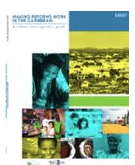The Caribbean Growth Forum (CGF) was thus designed to respond to these concerns: to be both a forum of dialogue to identify needed reforms, and a catalyst for the implementation of agreed reform priorities, creating the needed accelerators to make reforms happen, while keeping in mind the political economy factors that have impeded reforms in the past. Since inception, the CGF process has been solidly grounded on few core principles: (i) tailoring: the approach is based on locally defined problems and solutions (home grown); (ii) action-orientation: prioritization and sequencing of reforms (e.g., combining gradual reforms with longer term structural changes) and their translation into clear, achievable and measurable targets, dashboards and roadmaps for implementation; (iii) transparency: making both targets and the process public to increase participation and shared commitments, thus creating a routine culture of public reporting to track progress openly (introduce behavioral changes); (iv) flexibility: to ensure that the process allows for adjustments if targets are not reached and to create space for innovation; and (v) accountability: infusing a sense of shared responsibility across the coalition that is supporting change, thus moving from a blaming culture to a culture of finding solutions by doing; and, eventually, anchoring the process around a small group of responsible government officials and support them in delivering policies.
Tag: Caribbean
Connectivity for Caribbean countries : an initial assessment
Their vital relation with the Caribbean Sea is a defining factor for the many cultures, languages and countries that co-exist in the Caribbean. This factor acts as both the most important vehicle and as their most challenging obstacle to connect with the world, and represents the starting point for every single discussion around Caribbean states: the fact that they are sea-locked countries (for most), small economies, with a high level of vul¬nerability to natural disasters and a geographic location that calls for regional cooperation and integration. Two of these the fact that they are sea-locked and their location in the Caribbean pose critical and unchangeable barriers to maximizing the development of their infrastructure and connectivity. In consequence, exchanges of goods and services with the rest of the world are limited to air and maritime transport modes, logistics costs are gen¬erally higher, and they face a disproportionate risk disruption due to natural disasters. This all translates into a cost premium for developing both infrastructure and transport services, regardless of the degree of efficiency of the investment decision process


